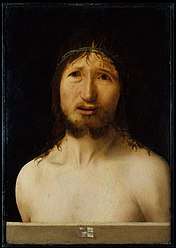Ecce Homo (Antonello da Messina)
Ecce Homo is the title of a series of paintings by the Italian Renaissance master Antonello da Messina. They date from 1470[1] to 1475.
Paintings
Antonello is known to have treated this subject four times; three (b, c, d) are variations of the same design; a fourth (a) differs.
- a) Christ Crowned with Thorns, in the collection of Gaspar Méndez de Haro, 7th Marquis of Carpio in 1687; Don Giulio Alliata, Palermo, 1698, when it was said to bear the date 1470, now illegible; ...Michael Friedsam, New York; Metropolitan Museum of Art, acc. no.32.100.82.[2][3]
- b) Picture Gallery of Collegio Alberoni, Piacenza, dated 1472.[4]
- c) Kunsthistorisches Museum, Vienna, dated 1474.
- d) National Gallery of the Palazzo Spinola, Genoa.[5]
 c. 1470, Metropolitan Museum of Art
c. 1470, Metropolitan Museum of Art 1475, Piacenza
1475, Piacenza Palazzo Spinola, Genoa
Palazzo Spinola, Genoa
gollark: It would be sort of possible to port some bits, but it would lose the spirit of PotatOS\™.
gollark: No.
gollark: So what *do* you want it for?
gollark: 2. take a bare-minimum Linux distribution and a CC emulator. Set it up to autologin to the CC emulator with potatOS preinstalled.
gollark: 1. use whatever LuaJIT uses to JIT-compile stuff - obviously a runtime is still needed
See also
- Italian Renaissance painting, development of themes
Notes
- The date formerly visible on the ex-coll. Olivares painting at the Metropolitan Museum of Art.
- Federico Zeri and Elizabeth E. Gardner, Italian Painting: the Venetian School (Metropolitan Museum) 1973:2, pl. 2).
- Antonello da Messina. "Christ Crowned with Thorns". Art Object. The Metropolitan Museum of Art, acc. no. 32.100.82: The Metropolitan. Retrieved 9 June 2014.
This painting may date as early as 1470. [...] Christ is shown behind a parapet—a convention Antonello appropriated from portraiture. The device enhances the effect of Christ’s physical presence and suffering: "a Man of sorrows and acquainted with grief" (Isaiah 53:3).
CS1 maint: location (link) - "Ecce Homo in the Piacenza collection". Collegio Alberoni, Piacenza: Associazione Piacenza Musei. Retrieved 9 June 2014.
...the outstanding Ecce Homo by Antonello da Messina. Such painting is one of the top masterpieces by the painter from Messina, and deals with the key factor in his pictorial research, as confirmed by the stylistic comparison with other works of his, such as Ecce homo in Palazzo Spinola (Genova), Cristo Benedicente (Christ Blessing) at London's National Gallery and Cristo alla Colonna (Christ at the pillar) at Louvre.
- "Collaborations. Fondazione Spinola". Genoa: La Fondazione Spinola Banna per l’Arte. Retrieved 9 June 2014.
...2000 exhibition “Ecce Homo by Antonello da Messina – Genoa and Piacenza, A Comparison between two Different Versions” National Gallery of Palazzo Spinola, Genoa
Further reading
- Barbera, K, ed. (2005). Antonello da Messina : Sicily's Renaissance master. New York: The Metropolitan Museum of Art.
External links
- Description (in Italian)
This article is issued from Wikipedia. The text is licensed under Creative Commons - Attribution - Sharealike. Additional terms may apply for the media files.